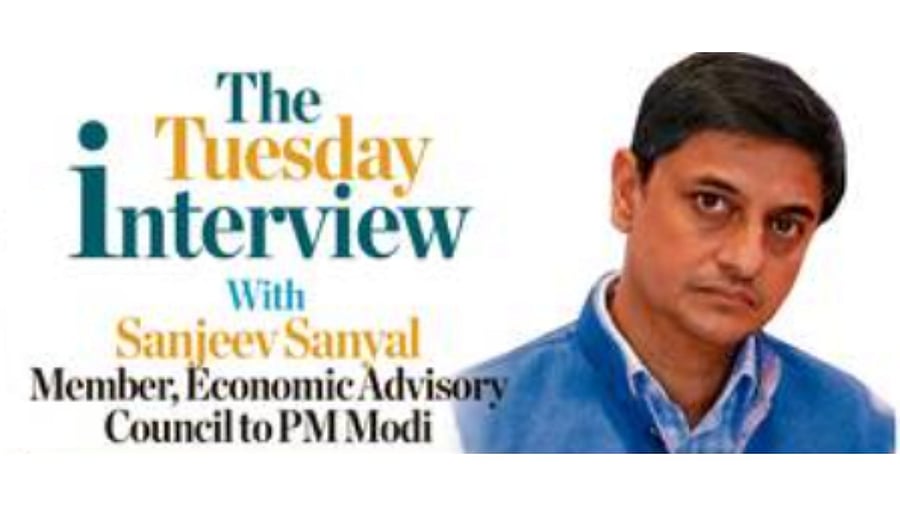
India is well-positioned to capitalise on the shifting global world order, driven by tariff and trade disruptions under the new US administration, according to Sanjeev Sanyal, a member of the Economic Advisory Council to the Prime Minister (EAC-PM). In an exclusive interview with DH’s Arup Roychoudhury, Sanyal emphasised that while India has the talent for deep tech and artificial intelligence, a transformation in corporate culture is essential to stay competitive.
Excerpts:
How do you view the recent Union Budget, especially the tax cuts?
I am glad the budget has been well received. There are obviously the more immediate demand-oriented issues that may have been part of the thinking behind the tax cuts. However, I think there is a longer-term and bigger reason for thinking about lower taxes for the middle class. To that end, you have to remember what we want Viksit Bharat to be. Viksit Bharat ultimately will have to be driven by an energetic, risk-taking, confident middle class. And so these tax cuts are one ingredient in creating such a confident section of society.
Of course, one can argue that we should have been able to do this earlier, but the fact is we also had to take into account fiscal considerations. We had two years of Covid, which were very expensive fiscally. Then we had a period of consolidation. So now we are in a position where we have the fiscal resources to provide this cut. So we have done so now.
With global trade and tariff disruptions under US President Donald Trump, how should India navigate the current geopolitical situation?
We have maintained good relations with President Trump, reaffirmed by Prime Minister Modi’s recent visit. On the face of it, many of President Trump’s policy announcements were expected. Whatever it may mean for relationships of the US with other countries, so far, we have not had anything that is adverse. If anything, it in fact creates some opportunities for India—we may be able to take advantage of tariffs on other countries and improve our trade balance.
Also, the shutdown of USAID—an organisation we have known historically and are now aware of its funding of disruptive activities in other countries—is a positive development.
In the current geopolitical context, especially when Trump has spoken out against BRICS and snubbed G20, should India work to bring these institutions closer?
These are difficult things to do in a simplistic way. We have been quite clear that we are multi-aligned. And we don’t see BRICS as some kind of an anti-US formation at all. After all, we are simultaneously parts of many things in which the US is also part, for example, the Quad. We do think that G20 is an important institution. We ourselves hosted it a couple of years ago, with some success. I would not say that whatever the US is resetting with the rest of the world has so far had a direct impact on us.
If anything, our relations have remained very much on keel. And in fact, it may even create some opportunities for us to do creative things when you have a more fluid environment. Do remember, the old world order was built when we were not a serious player. This was after the collapse of the Soviet Union, in the early 90s. We were a much smaller, weaker participant in the world. That order is now getting reset. That actually gives us space, since you have a more fluid situation, to renegotiate our place in the world. It’s a matter of taking advantage of the opportunities as they emerge.
In this context, how does India strengthen its manufacturing and trade capabilities?
India is now a serious player in the global services world, and we will continue to be. In manufacturing, we have some successes, like electronics, automobiles, cell phones, and so on. Now we need to focus on new sectors. And in this, there are two or three things. One is to target a few sectors that require to be built. And it is clear from the pronouncements in the last few months that shipbuilding is a key priority—new laws on ownership and flagging, the infrastructure status, the National Maritime Fund, and so on, which have now been put in place to drive shipbuilding as a major sector.
Another thing we need to do is boost research and development. As India emerges as the world’s third-largest economy, it cannot be a side player in technology or global rule setting. We have to start thinking like a world power ourselves, which means that we have to be willing to invest money and effort in cutting-edge innovation and lead the conversation in multiple fields.
About R&D, while India has the tech prowess, it lags behind the US and China in the AI and deep tech race. With the launch of DeepSeek, how can India compete?
First of all, much of the cutting-edge developments by Google and others happen in their India GCCs. So it is not that these things don’t happen in India. The question is whether Indian companies are doing it. It is about getting Indian companies to invest in these things. Now, in this context, let me say DeepSeek is certainly quite an achievement, even though I am sceptical about the claimed budget. It also tells you that the AI space is more contestable than people think. If DeepSeek can do it, others can too, including us. It is not a matter of budget. There are now large Indian companies that have balance sheets and profitability that can match any global company. So one of the things that we now really need is a shift in our corporate culture—to reward risk-taking, research, development, and innovation.